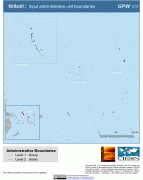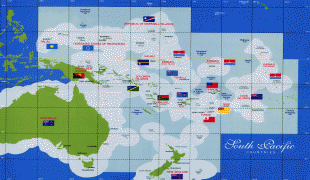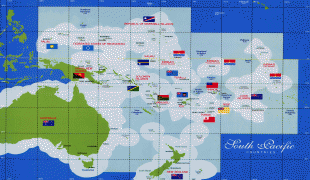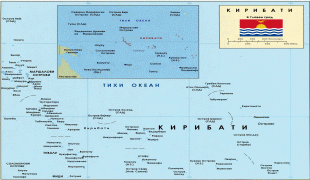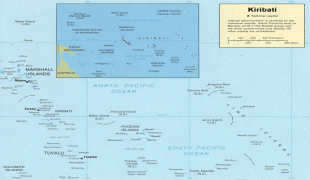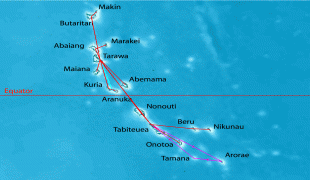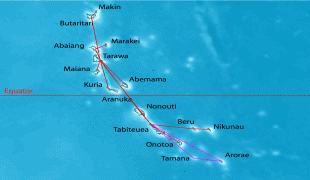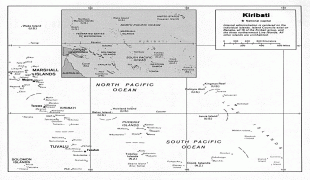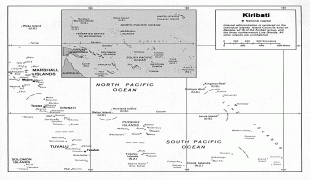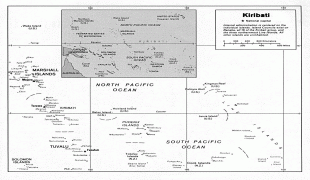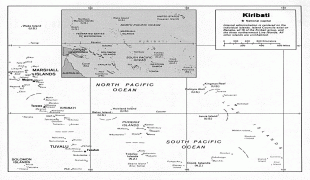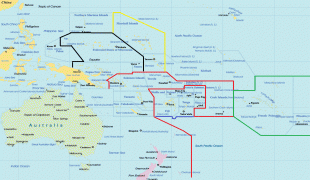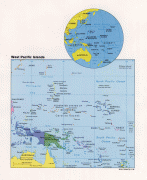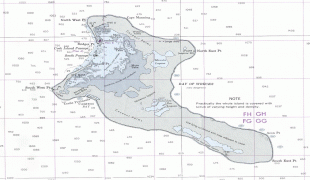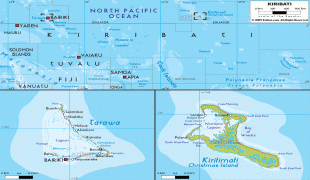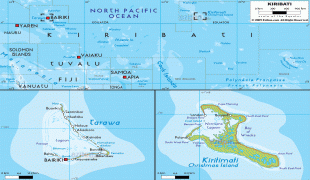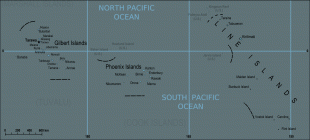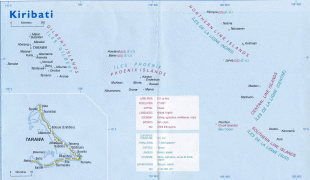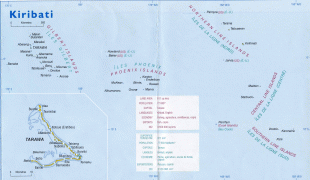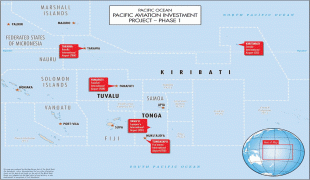Kiribati (Republic of Kiribati)
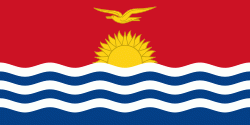 |
 |
| Flag of Kiribati | |
The islands' spread straddles the equator and the 180th meridian, although the International Date Line goes around Kiribati and swings far to the east, almost reaching 150°W. This brings Kiribati's easternmost islands, the southern Line Islands south of Hawaii, into the same day as the Gilbert Islands and places them in the most advanced time zone on Earth: UTC+14.
Kiribati gained its independence from the United Kingdom, becoming a sovereign state in 1979. The capital, South Tarawa, now the most populated area, consists of a number of islets, connected by a series of causeways. These comprise about half the area of Tarawa Atoll. Prior to its independence, the country had exported phosphate, but those mines are no longer viable with fisheries and export of copra driving much of the economy. Kiribati is one of the least developed countries in the world and is highly dependent on international aid for its economy.
Kiribati is a member of the Pacific Community, Commonwealth of Nations, the International Monetary Fund, the World Bank, and the Organisation of African, Caribbean and Pacific States, and became a full member of the United Nations in 1999. As an island nation, the islands are vulnerable to climate change and tsunamis. Addressing climate change has been a central part of its international policy, as a member of the Alliance of Small Island States.
The name is pronounced, Kiribass, as -ti in the Gilbertese language represents an s sound. Similarly, the name of its people, the I-Kiribati, is pronounced as e-Kiribass.
The name "Kiribati" was adopted in 1979 at independence. It is the Gilbertese rendition of Gilberts, the plural of the English name of the nation's main archipelago, the Gilbert Islands. It was named îles Gilbert (French for Gilbert Islands) in about 1820 by Russian admiral Adam von Krusenstern and French captain Louis Duperrey, after the British captain Thomas Gilbert. Gilbert and captain John Marshall sighted some of the islands in 1788, while crossing the "outer passage" route from Port Jackson to Canton. Both von Krusenstern's and Duperrey's maps, published in 1824, were written in French. In French, the Northern Islands were until then called îles Mulgrave and Byron Island was not part of them.
In English, the archipelago, particularly the southern part, was often referred to as the Kingsmills in the 19th century, although the name Gilbert Islands was used increasingly, including in the Western Pacific Order in Council of 1877 and in the Pacific Order of 1893.
The name Gilbert, already in the name of the British protectorate since 1892, was incorporated into the name of the entire Gilbert and Ellice Islands Colony (GEIC) from 1916 and was retained after the Ellice Islands became the separate nation of Tuvalu in 1976. The spelling of Gilberts in the Gilbertese language as Kiribati may be found in books in Gilbertese prepared by missionaries, but with the meaning of Gilbertese (demonym and language) (see e.g., Hawaiian Board of Missionaries, 1895). The first mention as a dictionary entry of the word Kiribati as the native name of the country was written down in 1952 by in his comprehensive Dictionnaire gilbertin-français.
The indigenous name often suggested for the Gilbert Islands proper is Tungaru (see e.g., Ernest Sabatier, 1952–1953, or Arthur Grimble, 1989). The rendition Kiribati for Gilberts was chosen as the official name of the new independent nation by the chief minister, Sir Ieremia Tabai and his cabinet, on such grounds that it was modern, and to comprehend the inclusion of outer islands (e.g., the Phoenix Group and Line Islands), which were not considered part of the Tungaru (or Gilberts) chain.
Currency / Language
| ISO | Currency | Symbol | Significant figures |
|---|---|---|---|
| AUD | Australian dollar | $ | 2 |
| ISO | Language |
|---|---|
| EN | English language |






